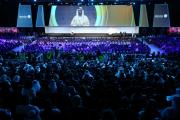|
|
|
|

|
10th World Future Energy Summit Demonstrates the Business Case for Sustainability
Published Aug 24, 2016
|
With the cost of solar energy plummeting, the World Future Energy Summit 2017 (WFES) will showcase an unprecedented range of financially profitable clean energy solutions, opening up opportunities for green tech companies as the MENA region moves to achieve ambitious sustainability targets.
Figures from the International Renewable Energy Agency (IRENA) show the installed cost of utility-scale photovoltaic (PV) solar generation in the UAE fell around 75 per cent between 2008 – the year of WFES’ first edition – and mid-2014, dropping from USD 7 per watt to less than USD 1.5 per watt. In late 2014, bids to build a 100 MW PV project in Dubai broke world records for cost-competitiveness, with the lowest bid at US 5.8 cents per KWh. By June 2016 a Masdar-led consortium won the bidding for phase three of the Mohammed bin Rashid Al Maktoum Solar Park with a levelised cost of electricity of just US 2.99 cents per KWh.
Masdar CEO, Mohamed Al Ramahi, said: “The MENA region’s appetite for investment in renewables has grown with the decline in cost and advancement in technological efficiency. This has further driven the growth of the market. Renewable energy is now an efficient and commercially attractive means to address growing energy demand. Regional leaders such as Masdar, and platforms such as the World Future Energy Summit, which is held during Abu Dhabi Sustainability Week, the largest sustainability gathering in the region, have been helping to drive the industry forward and reinforce the business case behind diversifying our regional energy-mix.”
WFES was created to drive the business of clean energy, offering a marketplace where suppliers of new technology can connect with buyers. Since 2008, the economics of that marketplace have changed dramatically, and WFES 2017 brings together solutions that are not only sustainable, but are increasingly the more cost-effective option. That’s especially true when the long-term returns required for new-build infrastructure are factored in.
Part of Abu Dhabi Sustainability Week (ADSW) from 16 to 19 January and hosted by Masdar, WFES 2017 will bring together ADSW’s theme of ‘Practical Steps Towards a Sustainable Future’, with the WFES goal, ‘Sustaining the Clean Energy Consensus, Empowering New Players’.
Deals made at WFES have been at the center of a surge in renewables across the MENA region, particularly solar power. Some of the key projects in the GCC include a 100 MW utility-scale plant due to open in Mecca in 2018; Kuwait has signed a contract for a USD 385 million, 50 MW plant; in Abu Dhabi the Shams concentrated solar power (CSP) project went online in 2013. Further afield, the World Bank is supporting CSP developments in Egypt and Morocco, with renewables in North Africa seen as a path to reducing dependence on fossil fuel imports, and possibly as an opportunity to export power to Europe.
For desert regions, the impact of low-cost solar energy extends far beyond the power grid. Abu Dhabi’s Masdar is running pilot programs to use solar power for desalination – one of the GCC’s most significant consumers of electricity.
While governments in the region are setting ambitious targets, IRENA notes the faster-than-expected fall in costs means renewables are now seen as a financially sound investment. Within the GCC, shifting to renewables also frees up more of the region’s hydrocarbon reserves for export.
While renewables have previously been more expensive than conventional sources of energy, and so required subsidies, now the technology has dropped in price to the point where they can compete on their own terms. Particularly in countries where there is ample sunlight and undeveloped land for locating solar arrays, there is an enormous market opportunity for suppliers and investors.
Scheduled to follow the 2016 COP 22 meeting in Morocco and annual sessions of the United Nations General Assembly, WFES 2017 will bring together the world’s leading renewable energy professionals, policy makers, innovators and investors. The 2016 edition hosted 30,000 attendees from 150 countries, and 600 exhibiting companies. Previous editions have hosted respected international figures, including United Nations Secretary-General Ban Ki-moon, Nobel laureate and former Vice President of the USA, Al Gore, and Wen Jiabao, Prime Minister of China.
Along with WFES itself, the four-day exhibition and conference program now features five co-located events highlighting targeted aspects of sustainability. Each event makes a strong business case for innovation within its field.
Among these, International Water Summit (IWS) in partnership with ADWEA emphasizes water security issues, while EcoWaste, in partnership with Tadweer, offers solutions that turn environmental waste into a valued resource. For 2017, WFES Solar Expo and WFES Energy Efficiency Expo are being expanded as co-located events, showcasing the latest in solar technology and smart building solutions. The WFES Sustainable Transport Zone will also return, offering the latest solutions in energy-efficient vehicles.
WFES, the centerpiece exhibition, will be the largest-ever gathering of renewable energy and sustainability experts in the Middle East and North Africa, hosting prominent global thought leaders from the public, private, and academic sectors.
Alongside the exhibitions, the WFES and IWS Conference Programs will offer high-level, practical discussion of sustainability trends and innovations across energy, water, and waste, hosting thousands of the world’s leading experts.
Attendees will also gain hands-on waste management experience at the EcoWaste Workshops and Seminars, and share solutions and build partnerships at the Middle East and North Africa Municipalities Roundtable.
Supporting home-grown entrepreneurs, the live competition Innovate@IWS will return with a panel of distinguished judges awarding development funding for the region’s most promising water technologies.
Driving networking and the region’s sustainability market, Sustainability Business Connect will return to pre-arrange thousands of meetings between buyers and sellers. WFES 2016 hosted a record 1,735 executive buyers from 1,322 companies and 75 countries.
Posted by
VMD - [Virtual Marketing Department]
|
|
|

